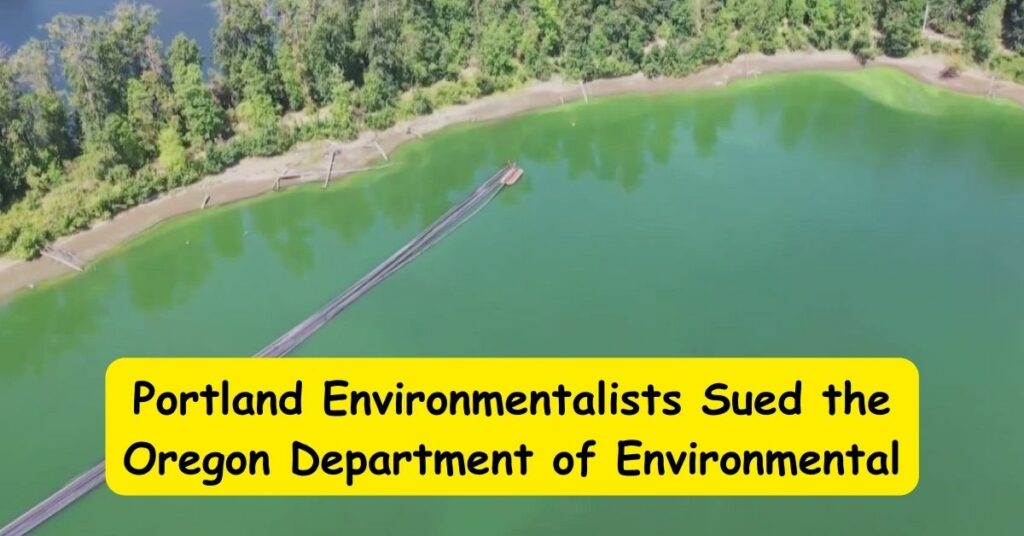An environmental organization has filed a lawsuit against Oregon’s water quality regulating body because the state has permitted Ross Island Sand & Gravel to significantly degrade water quality in the Willamette River, leading to the growth of toxic algae.
There was a lawsuit filed by the Northwest Environmental Defense Center against the Oregon Department of Environmental Quality for failing to uphold the Clean Water Act’s mandate to protect the chemical, physical, and biological integrity of the country’s waterways.
The complaint claims that the DEQ has designated the Willamette River as having “water quality limitations,” including TMDLs for dioxin, E. coli, and mercury. The Department of Environmental Quality has classified the river as impaired because of its high temperature, low levels of dissolved oxygen, lack of criteria, presence of toxic algal blooms, and presence of cyanide.
The aesthetic water quality, fishing, public household water supply, water contact recreation, fish, and aquatic life in Willamette are all negatively impacted by pollution.
According to Mary Stites, staff attorney at NEDC, “DEQ has the authority to impose certain conditions upon Ross Island in their reclamation activity to ensure that water quality, and what we use the water in the Willamette for, is protected so that the water quality doesn’t get worse.”
“And so, we believe that the existing issues in the Willamette, including the temperature, the existing turbidity, how aquatic life is able to live or not to live within the Willamette, is kind of in jeopardy because of the reclamation activity.”
Humans are not the only ones that suffer from algae blooms. Fish and other creatures also do. They develop rapidly in sunny environments with plenty of nitrogen and almost little humidity. The complaint claims these blooms sometimes spread along the Willamette River rather than just the lagoon.
“Right now, we are challenging a very discreet aspect that the DEQ basically certified through what is called a 401 certification that the reclamation activity that is going on in the lagoon, and as it’s being modified through the reclamation plan, will not harm the water quality of the Willamette River, and we challenge that conclusion,” said Stites.
Willie Levenson is Human Access Project’s mastermind. He is also on board with the legal action against DEQ.
“This is a great move,” said Levenson. “We aren’t named in the lawsuit, but we are supportive of it. DEQ is a really close partner of ours, so it’s exciting to be on a position where we support a lawsuit against DEQ.
But for me, it’s not about the people who work at DEQ who I believe are really committed to water quality…this is about the systems that are preventing more decisive action from DEQ.”
The toxic algal blooms are something Levenson has seen personally. Throughout the summer, he works to organize the Big Float on the Willamette River. In 2015, he says, the Willamette River began to turn green while he was preparing for the Big Float.
Levenson said, “I had no idea what a harmful algae bloom was at that point.” “So I reached out to the Oregon Health Authority and DEQ, and they informed me that it was harmful algae bloom that can k!ll dogs — it can make people sick.”
The most recent information on happenings at Oregon State is as follows:
- Oregon is K!lling Sea Lions Because of a Fight Over Rare Seafood.
- Oregon Banks Get $22 Million From the U.S. Treasury for Low-income Communities.
He said he had taken a water sample and sent it to the Midwest for testing before the Big Float, and the results showed that the algae in the water were safe to drink. In August of 2021, this drone camera captured the most current dangerous algal bloom, and here’s what Levenson had to say about it:
“It was horrifying to see the extent of harmful algae bloom,” said Levenson. “But also, it’s so visceral when you see that. I think it does a really good job of helping people understand why it’s so important to solve this problem, and the most important thing to understand is — this is a solvable problem.”
Levenson claims he and Oregon State University have been searching for technical solutions to the lagoon’s problems since 2017. He suggested digging a canal across the island to divert water flow and reduce the intensity of the algae bloom.
The DEQ is not being sued for any monetary damages. Yet, they must accept responsibility for the dangerous algal bloom situation plaguing Ross Island. “I know that if the regulatory agencies use their will, and Ross Island uses their will, it can be reclaimed in a way that will make it so that the public and the aquatic life can thrive.”
If you check out our website, you may read up on the most current news items we’ve covered.
